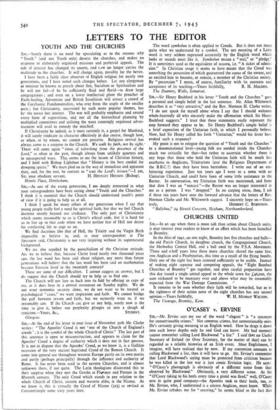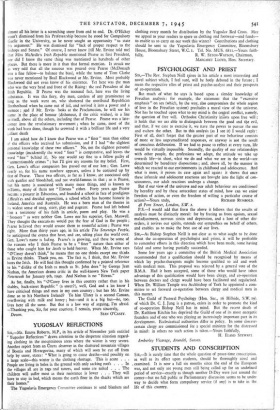O'CASEY v. ER VINE SIR,—Mr. Ervine says my use of
the word " elegant " is "a synonym for unmentionable crimes." Not common crimes, but unmentionable ones. He's certainly giving meaning to an English word. How he drags it down into such lower depths only he and God can know. My bad memory cannot remember calling Lord Blackwood "a liar." I said that no Under Secretary of Ireland (or Over Secretary, for the matter of that) can be regarded as a reliable historian of an Irish event. Most Englishmen, I imagine, will have realised that by now. If my contention amounts to calling Blackwood a liar, then it will have to go. Mr. Ervine's contention that Lord Blackwood's saying must be protected from criticism because he was killed in the last war is just comic Ervinian logic. He says: " O'Casey's photograph is obviously of a different scene from that observed by Blackwood." Obviously, a very different scene. As for " O'Casey taking to his heels every time a pistol was fired," well, O'Casey errs in quite good company—the Apostles took to their heels, too, as Mr. Ervine, who, I understand is a sincere Anglican, must know. While Mr. Ervine rebukes me for "sneering," he seems blind to the fact that
almost all his letter is a screeching sneer from end to end. Dr. O'Hickey wasn't dismissed from his Professo:ship because he stood for Compulsory
Gaelic in the University, so he never sought an opportunity "to state his argument." He was dismissed for "tack of proper respect to the bishops and Senate." Of course, I never knew (till Mr. Ervine told me) that Miss McArtile's Irish Republic mentioned Pearse as first President, nor did I know the same thing was mentioned in Inzidreds of other places. But there is more in it than that formal mention. It struck me as very odd that all the rancour was poured over Pearse (McDonagh was a fine fellow—to balance the bias), while the name of Tom Clarke was never mentioned by Basil Blackwood or Mr. Ervine. Most probably Blackwood did not even know of his existence. Yet here was the man who was the very head and front of the Rising: the real President of the Irish Republic. If Pearse was the nominal fact, here was the living substance. It was this fiery, shy man, careless of any prominence so long as the work went on, who shattered the moribund Republican Brotherhood when ha. came out of jail, and revived it into a power and a menace ; and if Mr. Ervin'. looks at the Proclamation, he will see his name :n the place of honour (dishonour, if the critic wishes), in a line to itself, above all the others, including that of Pearse. Pearse was a late- comer into the revolutionary movement ; when he came, most of the work had been done, though he crowned it with a brilliant life and a very I Rant death
I am asked how do I know that Pearse was a " finer " man than either of the officers who received his submission, and if I had "the slightest personal knowledge of these two officers." No, not the slightest personal knowledge (incidentally the ward " finer" is comparative, and leaves the word " fine " behind it). No one would say fine to a fellow guilty of
unmentionable crimes" ; but I'll give my reasons for my belief. First, Gen. Lowe's officer companion has passed out of our ken ; Gen. Lowe nearly so, for his name nowhere appears, unless it be conjured up by that of Pearse. These two officers, as far as I know, are associated only with gunfire and bloodshed, and not w.)rld-famous in that ; so is Pearse, hut his name is associated with many more things, and is known to many of them not " Eireans " either. Forty years ago Pearse became a pioneer in Education, and founded a school in face of prodigious d:fficult. es and decided opposition, a school which has become historic in Ireland, America and Australia. He was a born man of the theatre in its widest sense of song, story, play and pageant. Pearse had left behind Lim a testimony of his faith in article, poem and play. He was a " foreseer" as were neither Gen. Lowe nor his superior, Gen. Maxwell. They thought the executions would put the fear of God in the people ; Pearse believed they would arouse them to resentful action ; Pearse was right. More than thirty years ago, in his article The Sovereign People, he anticipated the events that have, and are, taking place the world over. Gen. Lowe's name is fading. Pearse's is growing, and these be some of the reasons why I think Pearse to be a "finer" nature than either of those who caught him for death to hold forever. When Mr. Ervine says "O'Casey doesn't think," he means that no one thinks except one th:nits as Ervine thinks. Thank you, no. The fact is, I think, that Mr. Ervine hates the Irish. He will find this thought confirmed by a pointed reference to his "dislike of the Irish as much as St. John does" by George Jean Nathan, the American drama critic in the well-known New York paper Newsweek for January 9th, 1940. And Nathan is no "Eirean."
As for, finally, his " O'Casey lives in this country rather than in his shabby, back-street Republic" (a sneer?), well, God and a lot know I have criticised things and men in my own country ; but has Mr. Ervine done so to his Northern Ireland? To him Ulster is a second Canaan, overflowing with milk and honey ; but—and it is a big but—he, too, lives here all the same. But that is a low way of arguing, I'm afraid. —Thanking you, Sir, for your comtesy, I remain, yours sincerely,































 Previous page
Previous page